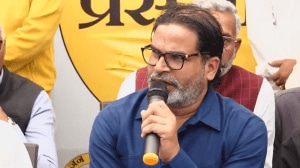Too much of a gentleman
"A good prime minister must be a good butcher!" was the advice offered by a veteran at that job to a novice. Over thirty years ...

"A good prime minister must be a good butcher!" was the advice offered by a veteran at that job to a novice. Over thirty years ago Indira Gandhi, then still learning the ropes, met the British Prime Minister. Harold Wilson was the man who had ended thirteen years of Conservative rule, then ran a minority government for two years before leading Labour to an overwhelming majority in its own right. He was in other words the ideal person to advise an inexperienced prime minister. History records that the pupil far outdid the mentor but that is another story.
Has Prime Minister Vajpayee been perhaps a little too hesitant to wield the meathook and cleaver? Well, yes and no.
The Prime Minister stood firm when asked to cut down his allies’ pet hates. the Amma’ in Poes Gardens has been demanding Muthuvel Karunanidhi’s scalp ever since the Vajpayee ministry assumed office, but the DMK chief is aware that he has little to fear. The Samata Party isn’t quite as voluble as it was about dismissing the, admittedly venal, Laloo Prasad Yadav regime in Bihar. (I refuse to participate in the farce of describing it as the Rabri Devi government). And by now even the fiery Mamata Bannerjee is toning down her demands to drive the Left Front out of Writers’ Building.
Article 356 has been abused so often that it was just as well that the Prime Minister chose to be a healer rather than a butcher in these cases, though I still think Bihar is a prime candidate for use of that law. However, the government has done itself no favours by being gentle in another sphere: the bureaucracy.
BJP circles are ruefully speaking of cases where people were permitted to continue in office and then dismissed amidst a blaze of adverse publicity. The four men named are Gill of Prasar Bharati, the Enforcement Directorate’s Bezbaruah, Narendra (the government’s pointman with the media), and of course Admiral Bhagwat. I won’t comment on whether all four deserved to be axed, but each one was clearly a case of "if it were done when’tis done, then’twere well it were done quickly…"
Gill, after all had been spoiling for a fight well before the government assumed office and his continuance in office was of doubtful legality after May 1998. Admiral Bhagwat has had a, shall we say, colourful career going back at least to 1990 (when he accused the then Prime Minister V.P. Singh of not applying his mind to national security issues!). It was fairly obvious that tempestuous times were in the offing when such men were around. Was it really necessary to wait until the storm broke?
At this point I am sure someone would like to raise the hoary chestnut about the civil service and the armed forces being totally apolitical. Very simple, it isn’t true now and I doubt if it ever was. At the very dawn of independence, it is recorded that over three-quarters of the Indian Political Service — the British-trained bureaucrats dealing with the princely states — opted for Pakistan because they couldn’t stand the Congress. Later yet, no civil servant made the mistake of thinking that Indira Gandhi’s call for ‘‘commitment’’ was limited to the judiciary. And as I noted in my last column, both Krishna Menon and Mulayam Singh Yadav played ducks and drakes with promotions for the sake of their favourites in the Army.
Up to a point it even makes sense for civil servants to be shuffled around when there is a change of government. There are plenty of ways in which an unwilling bureaucrat can delay the implementation of a policy which he disapproves of, perhaps indefinitely so. And setting policy is, or should be, the prerogative of the elected leadership. It is understandable of governments choose men who can be trusted to carry out orders rather than question them, occasionally even invoking the judiciary.
I am not arguing that every government should move bureaucrats around as soon as a new set of ministers takes over. However it needs to be understood that a ministry has the right to do so, subject of course to the supervision and criticism of Parliament.
That is something that is understood even in more mature democracies such as Britain and the United States. The arrival of a new man in the White House invariably leads to literally thousands of changes in personnel. Even in Britain, which enjoys a ‘permanent’ civil service, there are almost always some changes ushered in by a new administration.
But nobody comments on such changes when they take place in London or Washington because it is taken for granted that a new broom will sweep clean. Problems arise when they take place at a time when a government is expected to have found its feet. That, of course, is where the Vajpayee government erred on the side of humanity.
The Prime Minister is a gentleman, a ‘‘walker’’ in cricketing argot. Do you remember the first time that he asked for a vote of confidence from the Lok Sabha back in May 1996? He tried his best to convince the House to give his ministry an even break; when that didn’t work he walked off to Rashtrapati Bhavan to offer his resignation rather than push the issue. Left to himself, he would have preferred potentially troublesome civil servants — governors, ambassadors, and the like included — to do the honourable thing and fall on their swords. An outright axing will always be the last option.
Of course, the mistake made by the civil service at large was to mistake the Prime Minister’s natural courtesy for weakness. There was a tendency to think of the BJP’s ministers as people who could be pushed around. But that was always just a little silly. Think about it — the Vajpayee ministry’s majority is so slender that a handful of defections can pull it down, yet Jayalalitha’s more outrageous demands were always brushed aside. If she couldn’t move the BJP leaders beyond a point, why did the bureaucracy imagine that it could succeed?
The Vajpayee ministry has been the cleanest in recent years. It has had the guts to take unpopular decisions. But it has also, until recently, been a little too nice for its own good.
A friend of mine chuckled when he saw reports of a Cabinet expansion. ‘‘The BJP doesn’t have a problem with appointing the right people,’’ he said, ‘‘What the Prime Minister really needs is a Minister for Sacking Unhelpful People!’’ He might just have had a point.





- 01
- 02
- 03
- 04
- 05


























